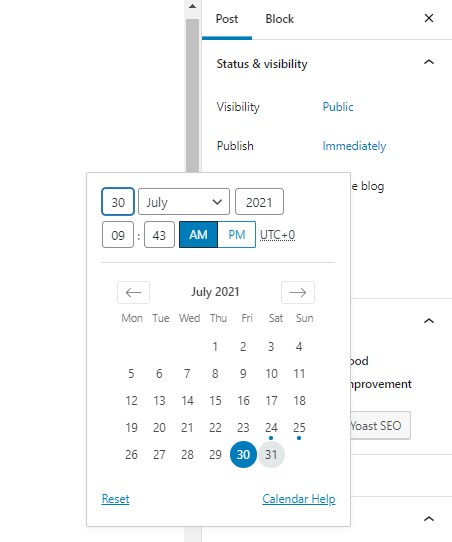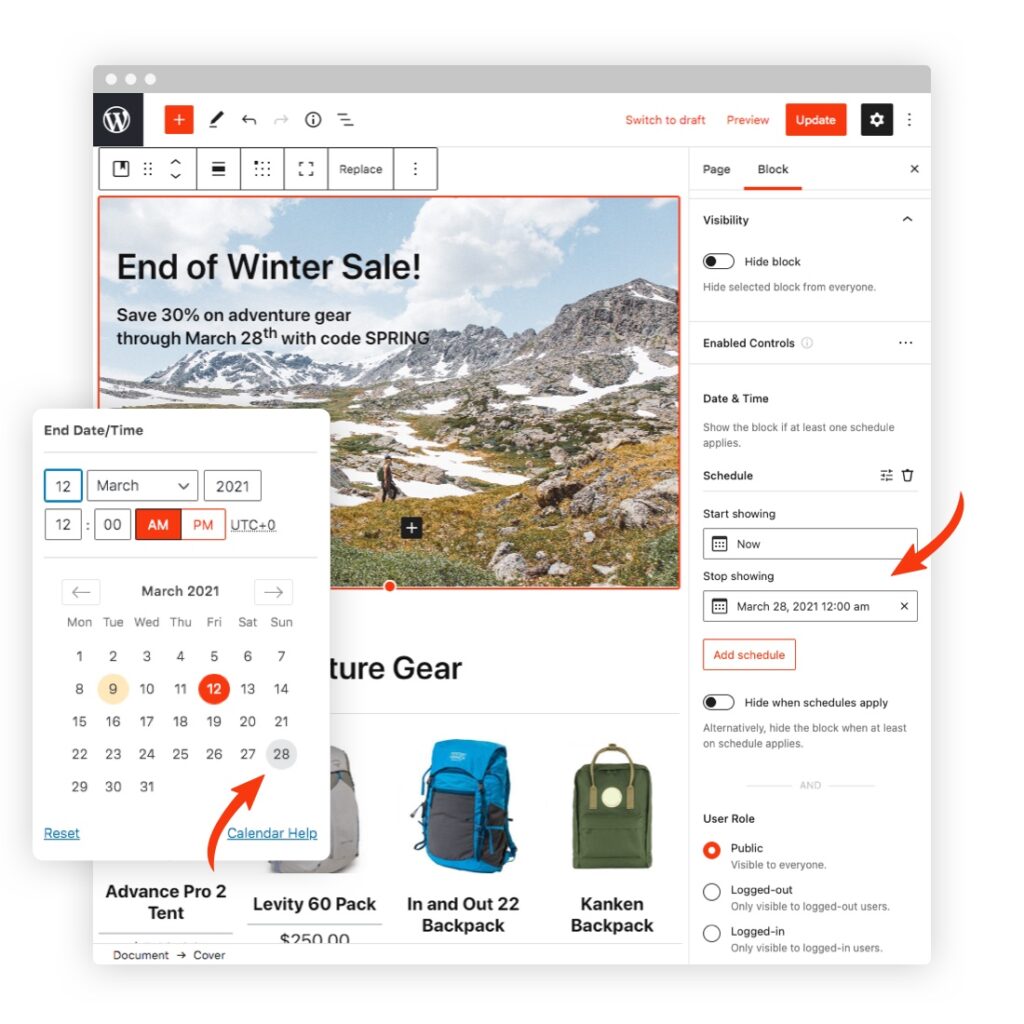When you manage a website, you are often confronted with some content that is time-sensitive and needs to be published at a very specific time. In this post, we explore many of these cases and give you a solution.
Let’s say that you must make an announcement for an event, but there is an embargo on the content before publishing. How do you manage this? Well, easy, you just use the built-in function on the top right of your post publishing screen, and choose the date and time (as well as timezone if your website is international).

In some cases, you will want to update the content of a page or a post at a specific time. For example, if you want to add a new employee of your company in the about page, but you only want to add him or her on the date he starts working for you, you can prepare the page to be updated on that date.
To do this, you can use a plugin like tao-schedule-update, which will create a copy of the page you want to update, then you can work on this page and plan the publishing for a further time and date. The plugin is marked as not updated for a while on the WordPress directory, but we just tested it and it still works fine.

For the cases where you need a post to disappear after a while, for example if it becomes irrelevant after a given date, you can schedule post expirations with WordPress by using a very simple plugin: Post Expirator.
Post Expirator is a very well designed plugin, as it lets you choose among many ways to expire a post: turn into a draft, change category, make private, stick or unstick,… These options make it the perfect homepage management tool.
It also comes with a shortcode if you want to display the expiration date and time of the post.
Being active on social media is crucial for any business nowadays, but it’s also extremely time-consuming. However, some tools empower you by letting you post automatically directly from the WordPress admin. A couple of these plugins are Nelio Content and Blog2Social, both operating on the freemium model. You can test it and decide for yourself which you like the best. If these are not what you’re looking for, you can do a quick search for “social media schedule” in the WordPress plugins repository.

If you are not backing up your WordPress website, you should immediately install a backup plugin. Most backup plugins will let you automate the task to ensure having up-to-date backups when anything happens. You should set it up according to the frequency of updates on your website, and ensure that it’s running smoothly from time to time.
Some of the most populat backup plugins for WordPress are:
Whether you are working with WordPress plugins or external tools such as Mailchimp for your newsletter, there will usually be some built-in function to send your newsletter at another time. This is especially useful if you are preparing several newsletters in advance or if you send your newsletter very early in the morning.
On top of that, these newsletter plugins will often give you the tools to send automatic emails based on the visitor’s actions or on the publishing on your website. Some good option for WordPress newsletters are MailPoet and Newsletter.
Planning your marketing campaigns can be a serious advantage in terms of efficiency, as it allows you to work on all you campaigns together and have a clear view of the overall campaign. To be able to achieve that on your website, you will need a tool that empowers you to launch the campaigns at the right moment. Combined with scheduled publishing and updating, using scheduled popups can be a great helper. Popular popup making plugins usually allow you to do this, like Popup Maker for example.

Although we are not big fans of sliders here at WP Expert, we understand that slides can add a nice visual touch to your front page, and they can be a nice way to convey information in a more promotional way. Being able to update the slides automatically, based on a schedule, is a great feature and can be integrated to your marketing strategy for temporary features. Slider by Soliloquy comes with a useful add-on for this, but plenty other plugins can also achieve this feature.
Another amazing tool to schedule parts of your content, the Block Visibility plugin, which lets you control when a block is displayed or not. This comes with a nifty scheduling functionality that allows you to have a full control over what you display on the page, and when.

Automatic WordPress updates are a great feature that improves the global security of WordPress websites, but if you run a website with a lot of traffic, you may want to add an extra layer of control over the updates. To prevent updates from happening at times of peak traffic, you can make them happen at night, when there are very few visitors on the site. How do you do this? With the help of the Easy Updates Manager, which comes with a cool scheduling features.
If the features seen above, such as the slider or block scheduler, are not enough for you to schedule front page customization, you can use this WordPress plugin that will give you the option to change which page of your site is used as front page based on a set of rules defined by yourself.
Maintenance mode is used by WordPress during the update of the engine or plugins. However, the type of “maintenance mode” covered here is more about creating “coming soon” type of pages and switching to the live site on a given date, which is extremely useful. This can be achieved by using this plugin.
Nowadays, there are plenty of WordPress security plugins, like WordFence or WP Cerber. Most of these plugins have options to scan your website for compromised files or database. These scans are quite resource intensive, so the plugins also allow you to perform these scans at a time and date scheduled by yourself.
For WooCommerce users, you know how having a sale in your online shop can help with selling more products. The WooCommerce Sale Discount Scheduler gives you plenty of possibilities when it comes to scheduling sales on your website and optimizing it.

Google changes the logo on its main page almost every day, making it an important part of the brand. Although you will probably not want to change every day, changing you logo on special occasions can add some life to it. The Logo Scheduler plugin’s main feature is to be able to schedule logo changes, so you can do all the work at once and you don’t need to come back to the site every time to change it.

For larger websites with a lot of traffic, it can be easy to lose track of the contact forms sent, which prevents you from having a good overview of what’s going on. If you are using Contact Form 7, as many website owners do, you can have reports of contact forms generated. With Advanced Contact Form 7 DB, you can even have these reports sent to you automatically on a given schedule.